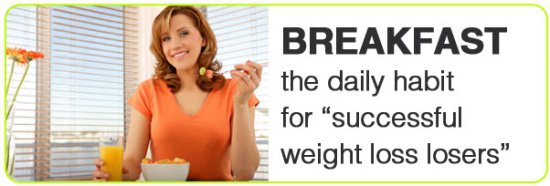Benefits of a Healthy Breakfast

Everyone knows that breakfast should be the most important meal of the day. 93% of Americans agree that breakfast is the most important meal of the day, yet less than half (44%) are eating breakfast every day ( 2009 International Food Information Council Foundation’s Food & Health Survey).
If you even eat breakfast, what’s in yours? Coffee? Sugar-laden cereal? A portable high-carbohydrate quasi dessert that you can eat while driving? Although our world is becoming time-compressed, our biological rhythms are not. While you sleep, your body is literally digesting itself to provide energy for the brain. Much of this energy comes from digesting muscle mass to make glucose as the supplies of stored carbohydrates in the liver are rapidly depleted during the night forcing the body to start digesting muscle to supply enough glucose to the brain. Rebuilding lost muscle mass demands protein replenishment upon waking; and, you aren’t going to get achieve that goal by eating sugar-laden breakfast cereal and definitely not by drinking a cup of coffee as a stimulant.
It has been known for some time there is a strong relationship between skipping breakfast, obesity and the subsequent establishment of poor dietary habits. Dr. Susan Kraus, MS, RD, registered dietician at the Hackensack University Medical Center in New Jersey, “without eating breakfast, you’re more vulnerable to cravings and less likely to make healthy choices in the morning and throughout the day.” Some studies have reported that people who skip breakfast often consume more calories over the course of the day and may gain weight by overcompensating with energy-dense, high-fat foods later in the day.
Furthermore, the higher the protein content of the breakfast, the greater the satiety. That increase in satiety is correlated with increased PYY (the satiety hormone) levels in the blood. It was also demonstrated more than 10 years ago that giving a higher-protein breakfast meal to overweight adolescents resulted in significant appetite suppression. This lack of hunger is correlated with dramatic changes in the levels of insulin and glucagon in the blood. A traditional breakfast of eggs may be the best way to get your morning protein plus the addition of a lean protein may be the boost you need to keep you feeling full until lunchtime.
Now a new study pre-published electronically indicates that a high-protein breakfast also dramatically alters brain function. Overweight adolescents who normally skipped breakfast were either given nothing for breakfast, a carbohydrate-rich breakfast, or a protein-rich breakfast for six days. On the seventh day of each breakfast cycle, they had an MRI scan of their brains while being shown pictures of various palatable foods on a screen. After consuming the higher-protein breakfast for six days, there was far less activation in the regions of the brain associated with food motivation and reward when shown the pictures of highly desirable foods. One surprising observation from this study is the primary reason given by the overweight adolescent subjects for skipping breakfast was not that they were trying to lose weight, but they just lacked the time or were not feeling hungry upon waking. The lack of time in the morning is understandable because adolescents don’t get enough sleep anyway. However, the lack of hunger is probably due to the rise of hormonal levels early in the morning to rouse someone out of sleep. This acts as a powerful stimulant. But the lack of breakfast means eating more snacks with higher calories throughout the day. Bottom line – eat a protein-packed breakfast. You’ll get the fuel and the mental advantage you need to start your day.
Make Breakfast a Habit.
Breakfast doesn’t have to be centered around traditional breakfast foods. If you don’t like those foods or don’t have the time to make them, give your breakfast a makeover by focusing on the foods you do enjoy. “Breakfast just means breaking the fast; it doesn’t mean you have to eat specific foods. Breakfast food alternatives just don’t come to mind because they weren’t taught to you,” says Kraus. “For sustainable energy, partner high-fiber foods with proteins that promote alertness, like egg whites, turkey, chicken, fish, and lean meats.”
Quick Breakfast Options.
- A veggie omelet and a piece of whole-wheat toast
- Breakfast Quiche
- South of the Border Omelet
- Oopsie Eggs Benedict
- A whole-wheat English muffin with low-fat cheese, a scrambled egg and a slice of tomato or lean ham
- Salmon on a ½ whole-grain bagel with light cream cheese
- Oatmeal with skim milk, raisin, and nuts with 4 ounces of orange juice
- Low-fat, Greek yogurt with a piece of fresh fruit
- Hard-boiled eggs with a banana
Eating a healthy breakfast instead of doughnuts and pastries can give you:
- A more nutritionally complete diet that is higher in vitamins, nutrients, and minerals
- Improved concentration and performance
- More strength and endurance to engage in physical activity
- Lower cholesterol levels
Plus, many studies have shown that breakfast eaters tend to weigh less than breakfast skippers. Don’t set yourself up for weight loss failure by skipping breakfast or indulging in coffee and portable pastries. Be a “successful weight loss loser” by starting your day with a healthy, nutritious and protein-packed breakfast.
